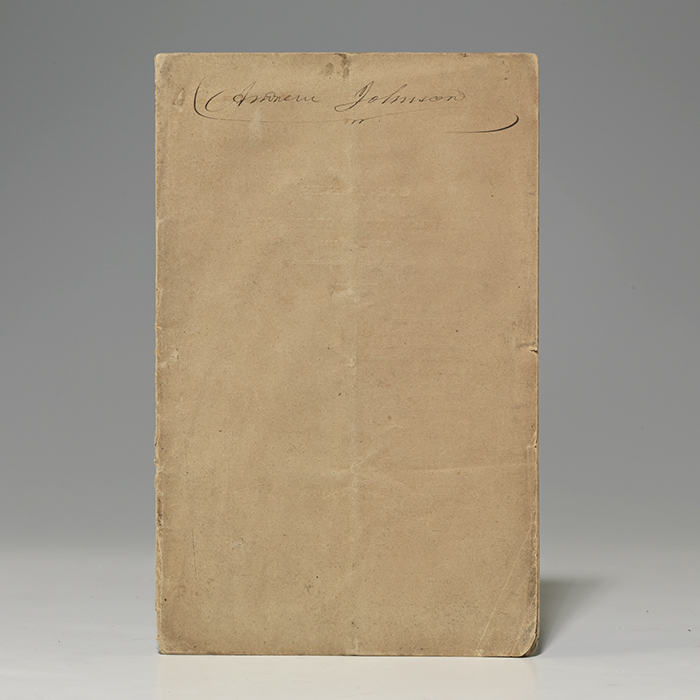
"NO CURRENCY CAN BE SOUND, WHICH DOES NOT CONSIST OF SPECIE, OR PAPER CONVERTIBLE INTO SPECIE": ANDREW JOHNSON'S TWICE-SIGNED PERSONAL COPY OF JOHN DIX'S ADDRESS ON THE ISSUANCE OF PAPER CURRENCY
DIX, John A. New Views of the Currency Question. No. III. Papers read before the Currency Reform Association of New York. (New York: Bankers' Magazine and Statistical Register, 1859). Octavo, original gray paper wrappers; pp 20. Housed in a custom clamshell box. $5800.
Andrew Johnson's twice-signed personal copy of John A. Dix's pre-Civil War address on the feasibility of the federal government to issue paper currency—converting paper money into specie proved to be a major issue in Johnson's 1867 Presidential State of the Union address—with Johnson's signature on both the front and back wrappers.
Tennessee Senator Andrew Johnson was Chairman of the Senate Committee to Audit and Control the Contingent Expenses from 1859-61. A former U.S. Senator from New York, Dix had served as Assistant Treasurer of the United States and Treasurer of the Assay Office at New York under President Franklin Pierce from 1853-54. Dix became Buchanan's Secretary of the Treasury on January 15, 1861 and served until Lincoln's appointee, Salmon P. Chase, was sworn in on March 6, 1861. In the article reprinted in this pamphlet, Dix wrote, in part, "It seems to me self-evident that no currency can be sound, which does not consist of specie, or paper convertible into specie at pleasure. Paper which cannot be so converted is a mere evidence of debt, and has no more claim to the character of a currency than any other evidence of debt, no matter what form it may take. The only legitimate currency for any country is coin; and until within the last two centuries there was no other… Nearly all the 32 States of the Union have created banks, and authorized them to issue bills for circulation, without requiring them to keep on hand an equal amount of specie at all proportioned to the amount of bills issued."
The enormous cost of the first year of the Civil War two years later caused a financial crisis. The uncertainties of war resulted in people across the nation exchanging their state bank paper currency for specie. New York, Boston, and Philadelphia banks suspended the exchange of paper for gold when their reserves were depleted. Less than a year after Salmon P. Chase succeeded Dix as Secretary of the Treasury, he announced to the Congress, "Immediate action is of great importance. The treasury is nearly empty." On February 25, 1862, Congress passed a bill "to authorize the issue of United States notes, and for the redemption or funding thereof; and for funding the floating debt of the United States." The Legal Tender Act authorized the printing of $150 million in Treasury notes. The bills were printed on only one side with green ink and soon became known as "greenbacks." President Andrew Johnson, in his December 3, 1867 State of the Union Address, wrote, "The present condition of our finances and circulating medium is one to which your early consideration is invited… At the beginning of the rebellion the bank-note circulation of the country amounted to not much more than $200,000,000; now the circulation of national-bank notes and those known as 'legal-tenders' is nearly seven hundred millions. While it is urged by some that this amount should be increased, others contend that a decided reduction is absolutely essential to the best interests of the country. In view of these diverse opinions, it may be well to ascertain the real value of our paper issues when compared with a metallic or convertible currency. For this purpose let us inquire how much gold and silver could be purchased by the seven hundred millions of paper money now in circulation. Probably not more than half the amount of the latter, showing that when our paper currency is compared with gold and silver its commercial value is compressed into three hundred and fifty millions. This striking fact makes it the obvious duty of the Government, as early as may be consistent with the principles of sound political economy, to take such measures as will enable the holder of its notes and those of the national banks to convert them without loss into specie or its equivalent. A reduction of our paper circulating medium need not necessarily follow. This, however, would depend upon the law of demand and supply, though it should be borne in mind that by making legal-tender and bank notes convertible into coin or its equivalent their present specie value in the hands of their holders would be enhanced 100 per cent." This pamphlet was most likely signed while Johnson was a U.S. Senator.
Interior fine, light wear and soiling to extremities of wrappers, faint vertical crease from folding. Near-fine condition, rare signed.